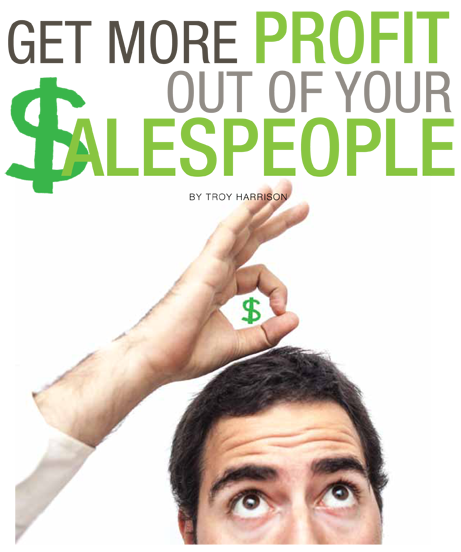Get more profit out of your salespeople

By Troy Harrison
How do you evaluate your salespeople? You should be looking at your salespeople as profit generators instead of revenue generators. The number one measure of a saleperson’s effectiveness (or a sales force’s effectiveness) is year-over-year profit dollar gain. This is the result you should be seeking. However, you can’t hold someone accountable for achieving a set of results without letting them know how to achieve them.
Many businesspeople (maybe you?) do just that every day; that is, they send their salespeople into battle with little or no idea of how to sell to generate the desired long-term results of the company. That’s because the corporate sales culture is very restrictive in terms of information given to salespeople. Too many business owners think that the way to make sure that their salespeople hold price and profit is to just not tell them what things cost, how profit is generated, and what prices generate the desired profit.
That’s a philosophy borne out of fear and distrust of salespeople in general, and their own salespeople in specific. It’s counterproductive. If salespeople don’t know what goods cost, and what profit needs to be generated, they don’t know specifically what constitutes a “good” or “bad” deal. They spend all their time returning to the “bat-cave” for the next price or proposal offer. Then they get disgusted with the process and move on to a new company. Or, they simply shoot to the bottom in terms of price.
The old saying, “knowledge is power,” applies here. Salespeople that know their own cost structures and profit structures are salespeople who are able to negotiate from a position of strength with the customer. They’re also salespeople who won’t be coming to your desk with deals that you know you can’t accept. If that sounds appealing, let’s talk about how to equip your salespeople to generate profit.
Teach your salespeople how your company makes money. I’m not talking about platitudes like, “We make money by selling our products.” I’m talking about getting out the old Profit/Loss, and showing them the cost of goods, ancillary costs, overhead and, yes, sales expenses. Give your salespeople enough information to understand how their actions, decisions, and proposals affect the company’s overall profit picture. I’ve managed numerous sales forces, and every time that I shared P&L information with them, our average price and profits went up. Salespeople are smart, and they are able to understand and buy into this type of information.
Simplify your pricing structure. Nothing leads to downward price pressure like a complicated pricing structure. Here’s a general rule: The more complicated your pricing, the more your customers fear getting taken – and want to negotiate price and profit. Equip your salespeople with the knowledge and tools to price in front of customers, on-site, when the iron is hot, and they will find it much easier to hold price. What your salespeople really want is to have the tools and ability to close business on-site. Give them that, and they’ll use it.
Pricing stability is a good thing. That doesn’t mean that you can’t raise or lower prices; what it does mean is that you shouldn’t do so like a hyperactive child playing Tiddlywinks. I once worked for a business owner who was constantly after the sales team to “get our price.” The trouble was that we didn’t really know what “our price” was on any given day or week. We gradually became less invested in our profit picture, because we never got a true feeling for what our profit picture was at any time – the owner reserved that knowledge for himself.
Don’t get weak; live by your own rules. If you want to know the Numero Uno way to frustrate your salespeople, this is it: Demand that your salespeople hold a particular price. Then, when the customer comes directly to you, give the customer a price you told your salesman that you “couldn’t accept.” This is guaranteed – NOTHING will upset your sales team and de-motivate them quite like this. Don’t be that guy.
Compensate and reward based on profit. This sounds intuitive, but actually, it’s not. At least, it’s not practiced very often. If your salespeople are to be profit generators, but you compensate and reward them based on revenue, they’ll always be after gross revenue. Instead, align all your measurements (compensation, bonus, stack rankings, and evaluations) based on gross profit generated during a given period.
Banish certain money-losing terms from the vocabulary. There are some things that salespeople say that are automatic money losers:
If your salespeople are saying these things, they’re costing you money – guaranteed.
Ultimately, the way that you treat your salespeople will be reflected in the way that they treat their customers. Treat them with fear and distrust, and you’ll see that in the treatment of customers. Treat them with respect and consideration, and you’ll see that reflected in better, stronger customer relationships, and more longevity in both your sales staff and your customer base.
 Troy Harrison is the author of “Sell Like You Mean It!” and his new book, “The Pocket Sales Manager.” He is a speaker, consultant, and sales navigator. He helps companies build more profitable and productive sales forces with his cutting-edge sales training and methodologies. For information on booking speaking/training engagements, consulting, or to sign up for his weekly E-zine, call (913) 645-3603, e-mail Troy@TroyHarrison.com, or visit www.TroyHarrison.com.
Troy Harrison is the author of “Sell Like You Mean It!” and his new book, “The Pocket Sales Manager.” He is a speaker, consultant, and sales navigator. He helps companies build more profitable and productive sales forces with his cutting-edge sales training and methodologies. For information on booking speaking/training engagements, consulting, or to sign up for his weekly E-zine, call (913) 645-3603, e-mail Troy@TroyHarrison.com, or visit www.TroyHarrison.com.
This article originally appeared in the March/April 2016 issue of Industrial Supply magazine. Copyright 2016, Direct Business Media.













